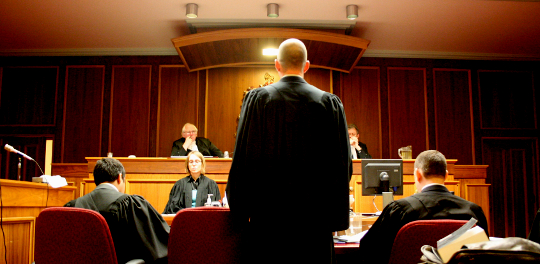This may have been the last music that Texas Trooper Bill Davidson heard before he was shot alongside a highway in 1992:
“I got a nine-millimeter Glock pistol/I’m ready to get with you on the trip of a whistle/So make your move and act like you wanna flip/I fired 13 shots and popped another clip.”
Ron Howard, whose tape of rapper 2Pac Shakur was said to be playing when he shot Davidson in the neck, was convicted and executed by lethal injection in 2005.
Should those lyrics, or ones like them, though, have anything to do with proving the guilt of someone on trial for a violent criminal offense?
Sociologist Charis Kubrin doesn’t think so and said she’s seeing an alarming trend of prosecutors using rap music lyrics in a prosecution of violent crimes. In fact, she said, she has encountered one prosecutor who had a handbook that said using rap lyrics in a criminal prosecution should be a “go-to” option.
Kubrin, a professor in the Department of Criminology, Law, and Society at the University of California, Irvine, has been studying the issue of crime and race for nearly 20 years.
When she started getting calls a few years ago to provide expert testimony or consultation about rap music in a criminal prosecution, she figured the burst in activity would be short lived. It wasn’t.
She started testifying in criminal cases involving defendants who were young, black rap musicians or writers of rap lyrics in 2011.
“It’s been pretty much nonstop since then, which is pretty sad,” Kubrin said. “I thought it would be a one-off, but since then I have identified hundreds of cases, and testified and consulted in about 40 cases.”
Kubrin said attorneys now contact her to help craft pretrial motions in prosecutions or defense appeals. “I am just shocked at how frequently this is occurring,” she said.
When using rap music or lyrics in criminal prosecutions, Kubrin said, strategies seem to develop that the music is either evidence of a motive for a crime or represents an actual threat.
In instances like these, what should be seen as art or a First Amendment right to expression is now being used as an autobiography of the suspect or even a confession to the crime in the lyrics. Prosecutors using these tactics, Kubrin said, seem to think that “if they’ve said it in their lyrics then it must be true. They’re taking the lyrics at face value,” she said.
What prosecution and juries may be missing, though, are the nuances of rap culture, specifically the style of rap known as “gangsta.”
The trend of using rap music in a criminal prosecution is growing in Canada and the United Kingdom where the “grime” music genre has emerged, according to Kubrin, who studies the connections between music and culture – specifically hip-hop and minority youth.
She tries to explain to juries the culture of rap music and how violence, sex, drugs, and misogyny are rampant lyrical themes and marketing ploys, especially for aspiring rappers.
The phrase “I’ma pop a cap in his ass” is a well-worn trope and appears often in rap music, Kubrin said. That doesn’t mean the lyricist or rapper will shoot someone, she said.
“What I don’t like is the very sloppy way the lyrics are thrown in, and prosecution making claims that are patently false,” Kubrin said. “You get a jury who knows nothing about rap music, you have no context, and it’s easy to see how a jury can be completely taken aback by the lyrics.
“It’s like someone who has never seen a horror movie, then taking them to see ‘Texas Chainsaw Massacre.’ Jurors need to understand the artist and the person, and that the one and two are not the same. I’m not asking jurors or prosecutors to like it or be fans of rap music, I’m just asking them to put this in context. Without that, it can horribly prejudicial. It’s still up to the jury to decide the facts of the case.”
John Hamasaki, a defense attorney in the San Francisco Bay Area, said just this week he received pretrial information from prosecutors who seek to admit five gangsta rap songs in a case he’s defending.
Hamasaki has been a criminal defense attorney in the Bay Area for nine years and has seen how rap music as evidence has exploded recently.
“The use has really skyrocketed to a dangerous proportion,” Hamasaki said. “It’s a really interesting but challenging form of evidence.”
In California, a gang enhancement on a criminal charge can add 15 to 25 years to a sentence.
Hamasaki said the themes that are prevalent in rap music – guns, life in the inner city and gangster lifestyle – have similar parallels in country music, with its guns, women, drinking, and trucks. Like Kubrin, he tries to make that connection with juries and to help keep rap from being admitted as evidence in most cases.
“You have to know the historical background of rap and hip hop,” he said.

















Speak On It!